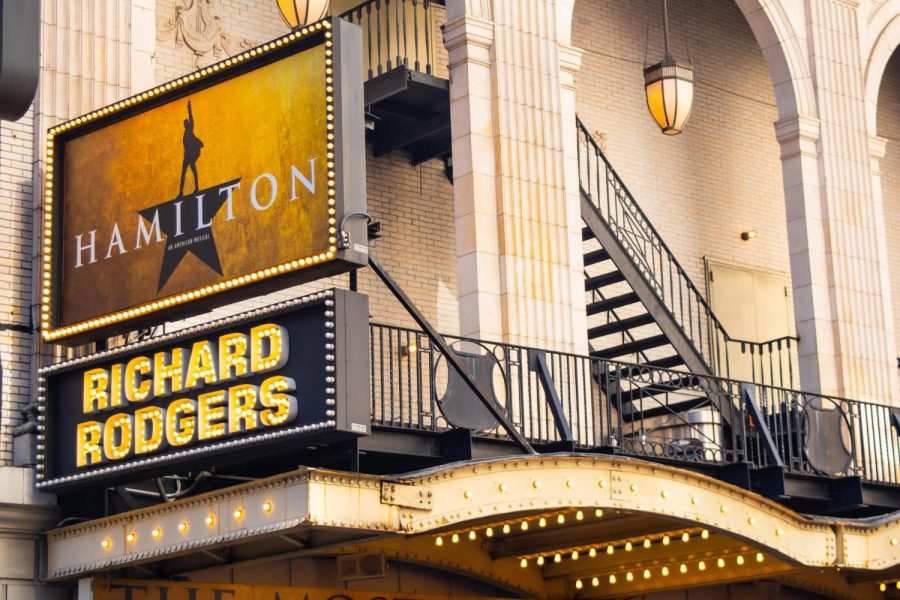The Great White Way is going dark for the first time in 19 years since 9/11. From March 12 through April 12, Broadway will be closed as New York attempts to prevent more coronavirus cases from spreading. This demand occurred after 328 people, including a Broadway usher for “Who’s Afraid of Virginia Woolf” and “Six,” tested positive for the coronavirus. While this decision is designed to protect the population from further contamination, many raise questions and concerns regarding purchased tickets, cancelled performances and the upcoming Tony Awards.
Before going dark, the industry tried to prevent further infection by cancelling stage door interactions between performers and fans. However, 31 shows currently play in Broadway theaters, each of which seat 500 to over 1,000 audience members, and some feared that losing that much profit would force their productions to close and cause hundreds of performers, crew members and production team members to lose their jobs. As a result, many shows, like “To Kill a Mockingbird” and the infamous “West Side Story” desperately offered discounted tickets in an attempt to continue to earn a profit. Many individuals took advantage of this deal without realizing how quickly the coronavirus would spread or anticipating all Broadway performances to temporarily close.
CAS sophomore Evan Silverman had tickets to see “Jagged Little Pill,” and planned months in advance to see one of Broadway’s biggest, high-demand productions.
“I bought the tickets back in early January when I had no clue that it [the coronavirus] even existed,” Silverman said. “I was going to see it with my family and I had heard great things about it.” Appreciative of the state’s concerns and action, Silverman is still extremely disappointed about missing the show and spending time with his family. He is now unsure if he will be able to receive a refund or tickets to a future performance.
Tisch senior Talia Cohen voiced similar concerns about ticket cancellations. She bought her tickets to “Jagged Little Pill” months before the coronavirus became a pandemic and was excited to see the show with her cousin. Even though she is disappointed that she will not see the show as soon as she anticipated, Cohen is pleased that the performance is cancelled.
“I am happy that Broadway is cancelled just because I was already starting to feel a little unsure about going to see a Broadway show. I don’t want to go into another tight, confined space with someone who might have it [the coronavirus],” Cohen said.
Services like Telecharge have already offered full refunds to people who purchased tickets for performances through April 12. Other tickets providers, like TodayTix and TKTS, have yet to release any sort of policies or next steps regarding the cancellations, creating anxiety for theatergoers who spent hundreds of dollars on a production they will not see in the next few weeks. If ticket providers choose to ignore the situation, customers will be disappointed and Broadway as a whole will suffer just before the Tony Awards.
While Broadway is scheduled to reopen April 12, productions must be open on or before April 23 to qualify for the Tony Awards. If the coronavirus persistently infects more individuals past April 12, Broadway may be forced to stay closed for longer, ultimately affecting and possibly disqualifying productions like “Sing Street,” “Birthday Candles” and “Take Me Out,” which open right before the Tony Awards’ deadline. With this possibility in mind, it is questionable if the Tony Awards will only consider the few productions that were open before Broadway’s shutdown or if it will make an exception by considering the affected productions for the 2020-2021 season as well. Either way, The Tony Awards are a huge marketing opportunity for productions. If select shows do not qualify for the awards due to the coronavirus, they will be forced to close from lack of ticket sales and revenue.
Despite the amount of media coverage about the coronavirus, Broadway is stuck in a lot of uncertainty regarding what will happen next. Broadway shows are in crisis and do not know what steps to take next, which are demonstrated through a lack of immediate vocalization and action. With productions’ funding, jobs and nominations on the line, they are left with no choice but to wait and hope that Broadway will reopen April 12.
Email Sasha Cohen at [email protected].

























































































































































